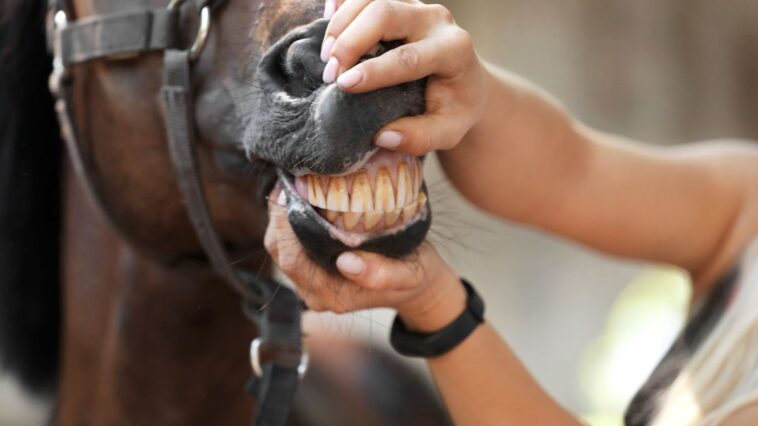Teeth floating is a fundamental aspect of equine dentistry vital in maintaining horses’ oral health and overall well-being. This procedure involves the removal of sharp enamel points and the correction of dental abnormalities, ensuring proper chewing, digestion, and comfort for the horse.
By understanding the importance of teeth floating and its benefits, horse owners can make informed decisions to prioritize their horse’s dental care.
What are Horse Teeth Floating?
Horse teeth floating, or dental floating, is a procedure horses perform to maintain their dental health. It involves the removal of sharp enamel points and addressing dental abnormalities to ensure proper occlusion (alignment) and function of the horse’s teeth.
During the floating process, the veterinarian or equine dental specialist uses specialized tools, such as floats or power instruments, to rasp or file down the sharp points that have developed on the teeth. These points commonly occur on the outside of the upper cheek teeth and the inside of the lower cheek teeth due to the natural chewing motion and continuous eruption of the teeth.
Floating aims to create a smooth and even dental occlusion, allowing the horse’s teeth to grind their food properly without causing discomfort or injury to the soft tissues in the mouth; removing the sharp points allows the horse to chew more efficiently, reducing the risk of ulcers, sores, or other dental issues.
In addition to addressing sharp enamel points, dental floating can also involve correcting dental abnormalities such as hooks, waves, ramps, or uneven wear patterns. These abnormalities can affect the horse’s ability to chew effectively and may lead to further dental problems if left untreated.
Floating is typically performed with the horse under sedation to ensure their cooperation and to allow for a thorough examination and treatment. Sedation helps relax the horse and allows the veterinarian or dental specialist to safely and effectively access the mouth and perform the necessary procedures.
Regular dental floating is recommended for most horses, typically annually, although the frequency may vary depending on the individual horse’s dental condition and needs. By maintaining proper dental health through floating, horse owners can help prevent dental issues, promote better digestion and nutrition, and ensure the overall well-being of their equine companions.
Why Is It Important For Your Horse’s Oral Health?
Maintaining your horse’s oral health, including regular teeth floating, is crucial for several reasons:
Proper Chewing and Digestion: Horses have evolved as herbivores with a specialized dental structure for grinding and chewing fibrous plant material. The teeth-grinding action is essential for breaking down food into smaller particles, facilitating proper digestion. If the teeth have sharp points, hooks, or other abnormalities, it can impede the chewing process, leading to inadequate digestion and nutrient absorption.
Comfortable Eating: Dental issues, such as sharp enamel points or ulcers caused by malocclusion, can cause discomfort and pain while eating. Horses may drop feed or hay from their mouth, exhibit reluctance to eat, or display behavioral changes related to eating. Regular teeth floating help eliminate sharp points and correct dental abnormalities, ensuring your horse can eat comfortably and enjoy a healthy appetite.
Prevention of Dental Disorders: Regular teeth floating can prevent or address dental disorders that may develop over time. Dental abnormalities like waves, ramps, hooks, or uneven wear patterns can affect the alignment and occlusion of the teeth. If left untreated, these conditions can lead to further dental issues, including accelerated tooth wear, periodontal disease, tooth fractures, or tooth loss. By addressing these problems through floating, you can help prevent more severe dental disorders from occurring.
Bit Comfort: Horses ridden or driven with bits require a properly aligned dental arcade for comfortable bit placement. Sharp enamel points or dental abnormalities can cause pain and discomfort when a bit is in the horse’s mouth. Regular teeth floating ensures a smooth and even dental surface, reducing the risk of bit-related discomfort and improving communication between the rider and horse.
Overall Well-being: Oral health is closely linked to the overall well-being of horses. Dental problems can cause pain, discomfort, weight loss, poor condition, and even behavioral issues. Maintaining your horse’s oral health through regular teeth floating can contribute to their overall comfort, health, and quality of life.
It’s important to note that dental care should be performed by qualified professionals, such as veterinarians or equine dental specialists, who have the necessary training and expertise to assess and address your horse’s specific dental needs. Regular dental examinations, including teeth floating when necessary, are essential for promoting optimal oral health and ensuring the well-being of your horse.
How Is The Procedure Done?
A veterinarian or an equine dental specialist typically performs the procedure of floating a horse’s teeth. Here is a general overview of how the procedure is done:
Sedation: Administering sedation is often necessary to ensure the horse’s cooperation and safety during the procedure. Sedation helps relax the horse, making it easier for the veterinarian to examine the mouth and perform the necessary dental work.
Mouth Examination: Once the horse is properly sedated, the veterinarian or dental specialist will use a speculum to open the horse’s mouth and gain access to the teeth. The speculum is a device that holds the horse’s mouth open, allowing for a clear view and easy access to the teeth.
Visual Inspection: The veterinarian will visually inspect the teeth, looking for sharp enamel points, dental abnormalities, signs of wear, or any other dental issues. They may use a light source and a mirror to examine hard-to-reach mouth areas.
Floating: Using specialized dental instruments such as floats, rasps, power instruments, or dental drills, the veterinarian will proceed to remove the sharp enamel points and address any dental abnormalities. The sharp points are filed down, creating a smoother and more even dental surface. The instrument choice may vary depending on the practitioner’s preference and the horse’s needs.
Correction of Dental Abnormalities: If the horse has dental abnormalities like hooks, waves, ramps, or uneven wear patterns, the veterinarian will work to correct these issues during the floating procedure. This may involve reshaping the teeth or adjusting the dental arcades to improve occlusion and alignment.
Checking for Loose or Damaged Teeth: The veterinarian will also check for loose or damaged teeth while floating. Loose teeth may require further assessment and treatment, including extraction if necessary.
Rinse and Evaluation: After the floating procedure, the horse’s mouth will be rinsed to remove debris or floating residue. The veterinarian will then evaluate the mouth again to ensure that all necessary dental work has been completed and that the horse’s dental health is in good condition.
Post-Procedure Care: After the floating procedure, the sedation effects will gradually wear off, and the horse will recover. The veterinarian may provide post-procedure instructions, including feeding recommendations, monitoring for discomfort or complications, and scheduling future dental examinations.
It’s important to note that the exact procedure may vary depending on the specific needs of the horse and the preferences of the veterinarian or dental specialist performing the floating. The use of sedation, appropriate instruments, and the expertise of the professional ensure that the procedure is performed safely and effectively to maintain the horse’s oral health.
Signs That Your Horse May Need Teeth Floating
Several signs may indicate your horse needs teeth floating. It’s important to be observant and look out for these signs, as dental issues can affect your horse’s overall health and well-being. Here are some common signs that your horse may need teeth floating:
Difficulty Chewing or Dropping Feed: If your horse has difficulty chewing or frequently drops partially chewed food from their mouth while eating, it could indicate dental problems. Sharp enamel points or dental abnormalities can cause discomfort, making it challenging for the horse to chew their food effectively.
Weight Loss or Poor Body Condition: Dental issues that interfere with proper chewing and digestion can lead to weight loss or poor body condition. If your horse is losing weight despite having sufficient food available, it may be a sign that their teeth are not allowing them to process and absorb nutrients effectively.
Unexplained Bad Breath: Foul-smelling breath can be a sign of dental problems, such as gum disease, tooth decay, or infected teeth. These issues may require dental attention, including teeth floating and tooth extractions.
Behavioral Changes During Eating: Horses in discomfort may exhibit behavioral changes. They might show irritability, become reluctant to eat or display frustration or aggression while trying to consume their feed. These changes in behavior could be a result of dental pain or discomfort.
Head Tilt or Head Shaking: It could indicate dental issues if your horse tilts or shakes its head while riding or eating. Uneven wear or sharp points on the teeth may cause discomfort when the bit is in the mouth or chewing.
Excessive Salivation or Drooling: Excessive salivation or drooling can indicate dental problems. Pain or discomfort in the mouth can lead to increased saliva production or difficulty swallowing saliva, resulting in drooling.
Swelling or Discharge from the Face or Jaw: In more severe cases, dental issues may lead to swelling, abscesses, or discharge in the face or jaw area. These signs may indicate an infection or other advanced dental problems that require immediate attention.
It’s important to note that these signs can also indicate other health issues, so it’s crucial to consult with a veterinarian or equine dental specialist for an accurate diagnosis and appropriate treatment. Even if your horse does not display obvious signs, regular dental examinations are essential for maintaining good oral health and early identification of dental issues.
Frequency of Teeth Floating and Cost
The frequency of teeth floating for horses can vary depending on various factors, including the individual horse’s dental condition, age, diet, and overall oral health. Most horses benefit from having their teeth checked and floated at least once a year. However, some horses may require more frequent floating, while others with excellent dental health may need it less often, such as every 18 months to 2 years.
Working closely with a veterinarian or equine dental specialist who can assess your horse’s specific needs and recommend an appropriate floating schedule is important. Factors such as dental abnormalities, uneven wear patterns, or specific dental issues may require more frequent floating.
As for the cost of teeth floating can vary based on factors such as geographical location, the practitioner’s expertise and experience, and the horse’s specific dental needs. The cost may also depend on whether sedation and additional procedures, such as extractions or advanced dental treatments, are required.
Typically, the routine teeth floating procedure cost can range from around $100 to $300 or more. However, you must consult with local veterinarians or equine dental specialists to get accurate pricing information for your area and situation.
While teeth floating has associated costs, it is an important investment in your horse’s oral health, well-being, and performance potential. Regular dental care can help prevent more severe dental problems in the long run and contribute to your horse’s overall comfort and health.
Conclusion
Teeth floating is a crucial part of equine dental care, involving the removal of sharp enamel points and correcting dental abnormalities in horses. It maintains oral health, improves chewing and digestion, and improves the horse’s riding comfort.
Regular floating, typically done annually, prevents complications, promotes well-being, and enhances performance potential. Regular dental examinations and prompt action contribute to the horse’s health and comfort. Consulting qualified professionals are important.




